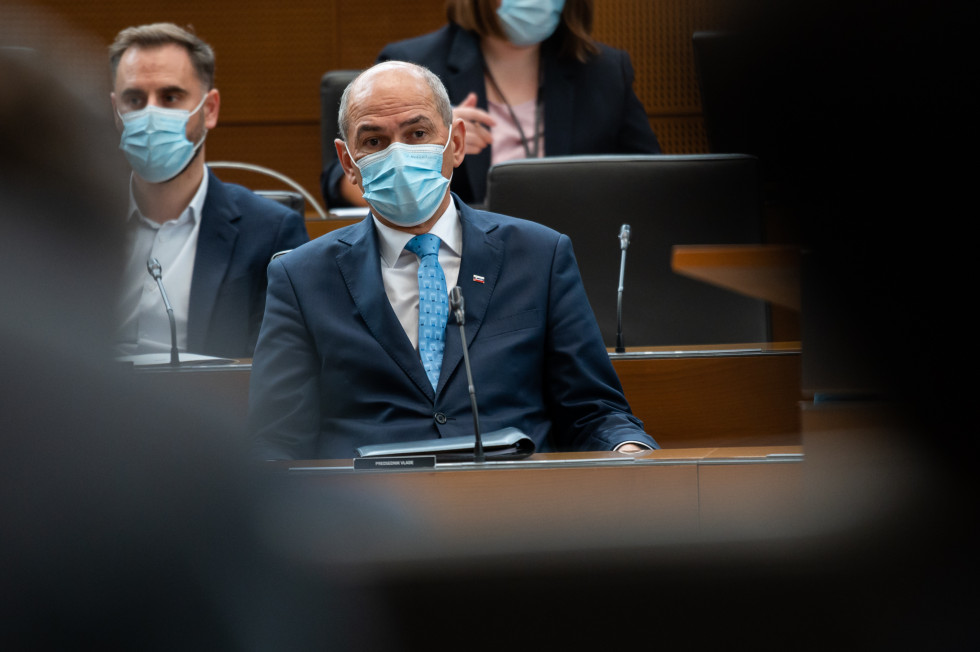Prime Minister Janez Janša takes questions from deputies
- Former Prime Minister Janez Janša (2020 - 2022)

PM Janez Janša at the 26th parliamentary session. | Author KPV
Deputy Bojana Muršič (SD) asked the Prime Minister about the increase in energy prices and other goods in Slovenia. The Prime Minister replied by stating that the whole world is battling the consequences of increasing energy prices. "Energy prices also rocketed in 2009 and that price increase resulted in higher costs of products linked to energy consumption. The Slovenian and European public have given assurances that this year's price rises are seasonal." In some places, long-term contracts have expired and the new contracts have prices up to four times higher. He said that this has not yet been the case in Slovenia, as none of the distributors' major long-term contracts have expired yet. Asked about the price increase by the company Petrol, the Prime Minister said that it was unwarranted and speculative. "Speculation can be dampened by reinstating margin regulation. One of the possibilities to help vulnerable households is to issue energy vouchers. The European Commission has also mentioned this possibility." The Prime Minister gave assurances that the Government will take appropriate measures regarding the energy prices increase and adopt all the measures that are or will be allowed within European single market rules. He added that the topic is also on this week's agenda of the European Council, while the Slovenian minister for infrastructure summoned an extraordinary council meeting of energy ministers for next week. "We will take action at both national and European levels."
Prime Minister Janša answered deputy Luka Mesec's question (Levica) by emphasising that Slovenia was not experiencing a spiral of violence of Slovenia, but that there has been an upward spiral of infections since the protest on 5 October. "Irresponsible behaviour, which was not caused by the police or by the Government, will force us to reintroduce measures – not measures regarding the recovered/vaccinated/tested rule, but rather measures that will once again shut down public life and the economy, cause further damage, stall recovery from the epidemic and cause more deaths." Answering this question, the Prime Minister also assessed that Slovenia has been experiencing the fastest growth of infections in Europe and renewed pressure on hospitals and intensive care units. "We can expect an upward trend in COVID-19 infections to continue this week." He also warned that vaccination coverage in Slovenia was too low to alter the recovered/vaccinated/tested rules into recommendations. Turning to the protests of recent years in front of the courts, when he was unconstitutionally serving a prison sentence, he said that those protests were authorised and there were no street or junction closures. "Protests taking place now are unauthorised. The protesters gather at junctions, while the people of Ljubljana are unable to peacefully pick up their children from kindergarten or go home from work. The provocation is severe." He also noted that forty police officers had been injured during the latest so-called peaceful protests.
Asked by Alenka Bratušek (SAB) about tackling environmental challenges, Prime Minister Janša said that, in addition to regulatory activities, the Ministry of the Environment and Spatial Planning will expedite investments into water supply that will enable the implementation of the constitutional right to clean drinking water. There are ten additional projects being implemented from the programme of the regional development agreement, which is a partial basis for the allocation of resources. Among the biggest projects is the upgrading of the B and C systems in the Pomurje region and the water supply in the Upper Sava area (known as the Krvavec water supply system), which will improve the water quality in the Kranj area and the surrounding municipalities. The Brkini water supply system project was also approved and represents an important investment to provide water supply in Slovenian Istria and the Karst hinterland. At the same time, a national plan is being prepared to provide an additional water source, which would guarantee an uninterrupted and high-quality water supply in the long term for a region with 100,000 inhabitants. For the first time in Slovenia's recent history, the €70 million recovery and resilience plan programme has also been used to finance investments in smaller water supply systems across the country, which have not been regulated in a systemic way to date. As regards the law banning the placing on the market of single-use plastic products, the Prime Minister said that the Government had already regulated this issue by decree. "However, we are not against regulating this issue at the statutory level, therefore, we did not oppose the legislation, which has our support in the current amended version."
In his reply to the question by Monika Gregorčič (SMC) on the Slovenian Presidency of the EU Council, Prime Minister Janša said that the Slovenian Presidency is the first presidency since the outbreak of the epidemic that is being operationally carried out in full and in line with the set agenda, without postponements caused by or on the pretext of the epidemic. He pointed out that Slovenia had not been deprived of any dossiers, as one deputy claimed, but rather that many dossiers from previous presidencies had been transferred to Slovenia.

